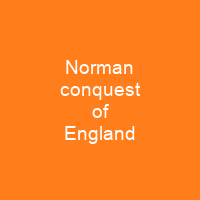The Norman conquest of England was the 11th-century invasion and occupation of England by an army made up of Normans, Bretons, Flemish, and men from other French provinces. William’s claim to the English throne derived from his familial relationship with the childless Anglo-Saxon king Edward the Confessor, who may have encouraged William’s hopes for the throne.
About Norman conquest of England in brief

Other effects of the conquest included the introduction of the Normanlanguage as the language of the elites, and changes in the composition of the upper classes, as William enfeoffed lands to be held directly from the king. The Domesday Book, a manuscript record of the \”Great Survey\” of much of England and parts of Wales being completed by 1086, shows that the Normans had a significant role in the development of the English language, culture and society. The Norman interest in English politics, as Edward drew heavily on his former hosts for support, brought in Norman courtiers, soldiers, and clerics and appointing them to positions of power, particularly in the Church. The Earl of Wessex, Harold Godwinson, the richest and most powerful of theEnglish aristocrats, was elected king and crowned by the Archbishop of York, although Norman propaganda claimed the Stigand, uncanonically elected Archbishop of Canterbury. Harold was immediately challenged by two powerful neighbouring rulers, Harald III of Norway and Harald Haracnut, who also contested the succession. In 1066 Harold’s army confronted William’s invaders on 14 October at the Battle of Hastings; William’s force defeated Harold, who was killed in the engagement. Although William’s main rivals were gone, he still faced rebellions over the following years and was not secure on his throne until after 1072. The lands of the resisting English elite were confiscated; some of the elite fled into exile.
You want to know more about Norman conquest of England?
This page is based on the article Norman conquest of England published in Wikipedia (as of Dec. 04, 2020) and was automatically summarized using artificial intelligence.







